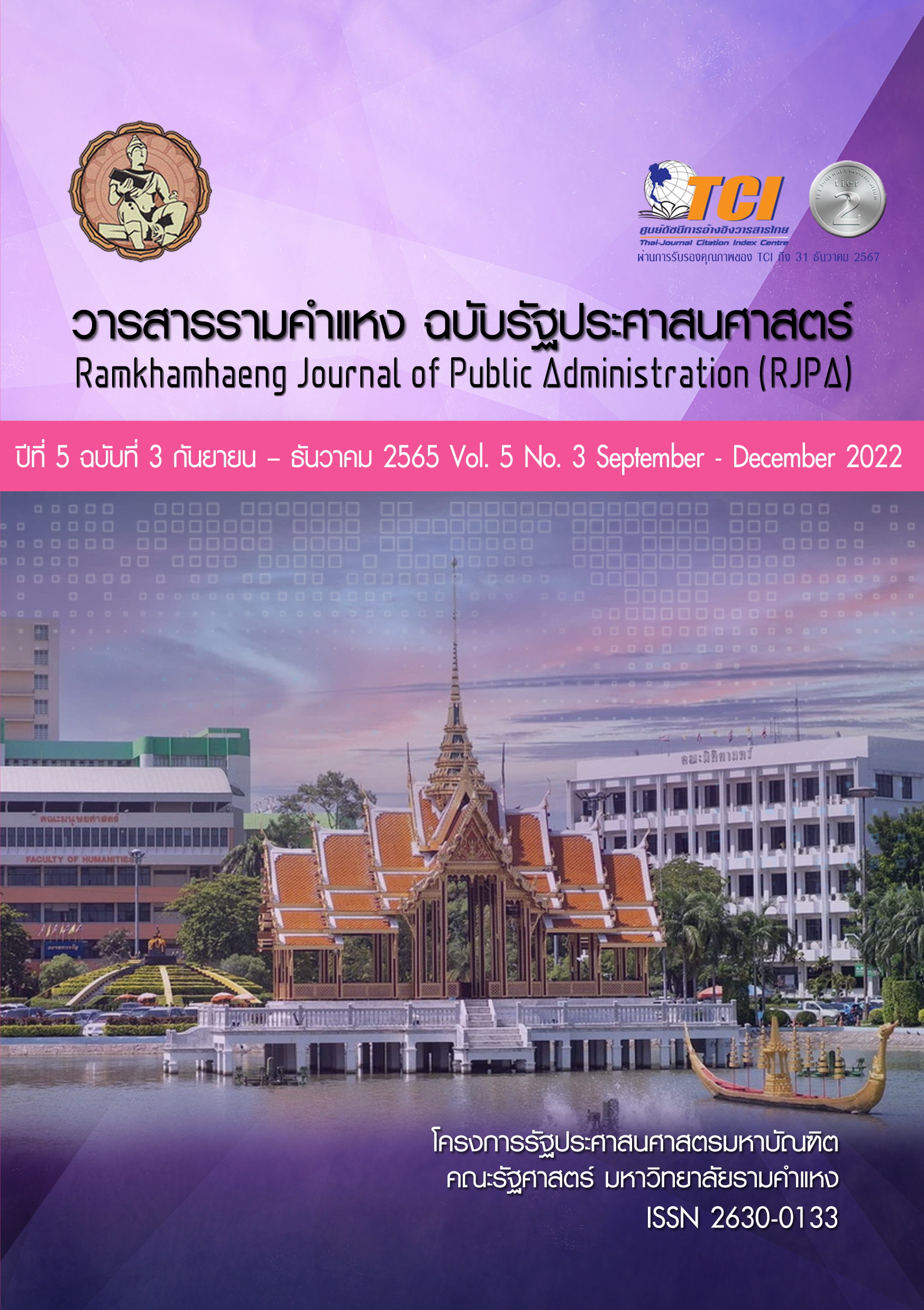The Patriarchy: The Violence in TV Drama Series
Keywords:
Patriarchy, violence, TV Drama seriesAbstract
The research article “the patriarchy : the violence in TV drama series” is a qualitative research method to analyze the contents of the patriarchical manner and the violence in four TV drama series: Klinkasalong, Baimaiteepidpew, Mianoi and Songnari.
The study has found that there are four drama series: Klinkasalong, Baimaiteepidpew, Mianoi and Songnari which are created by the patriarchical manner with direct violence such as slapping, hitting, punching, imprisonment, insulting, rape and killing
There are four drama series: Klinkasalong, Baimaiteepidpew, Mianoi and Songnari which are created by the patriarchical manner with structural violence from infidelity in the family. The infidelity makes wounds on women and destroy the dignity of love.
There are two drama series: Mianoi and Songnari which are created the patriarchical manner with structural violence by making women as sexual object. In Mianoi, the man uses money to buy women's bodies. In Songnari drama, the man betrays women and forces them to be prostitutions. As a result, these acts destroy the human dignity. Moreover, In Songnari drama, the father make his daughter as sexual object.
The study shows that the violence of TV drama series has reproduced the patriarchy. TV drama series producer believes that the violence of TV drama series is an attraction for audiences. But in fact, the violence of TV drama series is the inheritance of the patriarchal ideology in Thai society. On the other hand, the Korean drama series producer challenge the patriarchy by producing the feminization of masculinity such as warmth, gentleness, tendance and understanding. The Korean drama series producer makes the drama series for creating awareness to guide society in new values, motivating new behaviors and making process of learning through mass media.
References
กองทุนพัฒนาสื่อปลอดภัยและสร้างสรรค์. (2564). (6 สิงหาคม 2565). ความสัมพันธ์และความรุนแรงทางเพศในละครโทรทัศน์. สืบค้นจาก https://www.thaimediafund.or.th/ wp-content/uploads/2021/09/Fact-Sheet-2.2564-ความสัมพันธ์และความรุนแรงทางเพศในละครโทรทัศน์.pdf
ธเนศ วงศ์ยานนาวา. (2542). เท้าหลัง ย่างก้าว. กรุงเทพฯ : โครงการสตรีและเยาวชนศึกษา, มหาวิทยาลัยธรรมศาสตร์.
บุญรักษ์ บุญญะเขตมาลา. (2552). โรงงานแห่งความฝัน สู่การวิจารณ์ภาพยนตร์สำนักบริบท. พิมพ์ครั้งแรก. ชุดทฤษฎีและการวิจารณ์ภาพยนตร์. กรุงเทพฯ : สำนักพิมพ์พับลิค บุเคอรี่.
พรจันทร์ เสียงสอน. (2557). การนำเสนอภาพผู้หญิงและความรุนแรงในภาพยนตร์ไทย. วิทยานิพนธ์ศิลปศาสตรมหาบัณฑิต, สถาบันบัณฑิตพัฒนบริหารศาสตร์.
ภาณิชา พิมพ์ทองงาม. (2560). ความรุนแรงที่ปรากฏในละครชุด Club Friday The Series 9. การค้นคว้าอิสระนิเทศศาสตรมหาบัณฑิต, มหาวิทยาลัยกรุงเทพ.
พนิดา หันสวาสดิ์. (2544). ผู้หญิงในภาพยนตร์: กระบวนการผลิตซ้ำภาพลักษณ์ของผู้หญิงในสังคมไทย. วิทยานิพนธ์ศิลปศาสตรมหาบัณฑิต, มหาวิทยาลัยศิลปากร.
มูลนิธิสื่อมวลชนศึกษา โครงการมีเดียมอนิเตอร์. (2558). (30 กรกฎาคม 2565). รายงานผลการศึกษารอบที่ 87 จริยธรรมสื่อโทรทัศน์กับผลกระทบต่อพัฒนาการของเด็ก: ศึกษาเปรียบเทียบ โทรทัศน์ดิจิทัลช่องที่ได้รับความนิยมช่วง ตุลาคม 2557 และ มกราคม 2558. สืบค้นจาก
https://www.healthymediahub.com/storage/mediafiles/050050021W.pdf
ยศ สันตสมบัติ. (2548). เพศสถานะและเพศวิถีในสังคมไทย. กรุงเทพฯ : สำนักพิมพ์จุฬาลงกรณ์มหาวิทยาลัย.
อวิรุทธ์ ศิริโสภณา. (2561). (21 มกราคม 2564). การประกอบสร้างความหมายของผู้หญิงที่ถ่ายทอดผ่านตัวละครหญิงในละครโทรทัศน์ไทยยอดนิยมที่ถูกผลิตซ้ำ ระหว่างปี 2530-2560. วารสารนิเทศศาสตร์และนวัตกรรม นิด้า, 5 (1). 23-40. สืบค้นจาก https://so02.tcithaijo.org/index.php/jcin/article/view/163449/118200
อารดา ครุจิต. (2554). การวิเคราะห์เนื้อหาทางเพศ ความรุนแรง และการใช้ภาษาในรายการโทรทัศน์ ระดับเรตติ้งประเภท “ท” ทุกวัย. มหาวิทยาลัยธรรมศาสตร์, คณะวารสารศาสตร์และสื่อสารมวลชน.
Bandura, A. (1994). Self-efficacy. New York: Academic.
Farrar, L. (December 31, 2010). Korean Wave of Pop Culture Sweep
across Asia. Retrieved from http://edition.cnn.com/2010/ WORLD/asiapcf/12/31/ korea.entertainment/index.html
GMM25Thailand. (2562). เมียน้อย EP.2 [FULL]. สืบค้นจาก
https://www.youtube.com/watch?v=HjT7dTFlaV4&t=1695s
GMM25Thailand. (2562). เมียน้อย EP.9 [FULL]. สืบค้น
https://www.youtube.com/watch?v=jPodF6R9xOI&t=2837s
Gerbner, G., & Signorielli, N. (1988). Violence and Terror in the Mass Media: an Annotated Bibliography. New York: Greenwood.
Galtung, J. (1990). Cultural Violence. Journal of Peace Research, 27(3), 291-305.
Kim, Y. (2013). Korea Wave: Korea Media Go Global. London and New York: Routledge.
Nussbaum, Martha C. (2000). Sex and Social Justice. New York: Oxford University Press.
Netflix. (2562). กลิ่นกาสะลอง. สืบค้นจาก https://www.netflix.com
One31. (2562). ใบไม้ที่ปลิดปลิว EP.1 (FULL HD). สืบค้นจาก
https://www.youtube.com/watch?v=XzvUml3gBOg&t=2821s
Watchlakorn. (2562ก). สองนรี. สืบค้นจาก
https://www.watchlakorn.in/สองนรีตอนที่1วันที่19 สิงหาคม2562-video-288590
Watchlakorn. (2562ข). สองนรี. สืบค้นจาก
https://www.watchlakorn.in/สองนรีตอนที่11วันที่23กันยายน2562-video-292114
Downloads
Published
How to Cite
License
Copyright (c) 2025 วิสาขา เทียมลม

This work is licensed under a Creative Commons Attribution-NonCommercial-NoDerivatives 4.0 International License.



